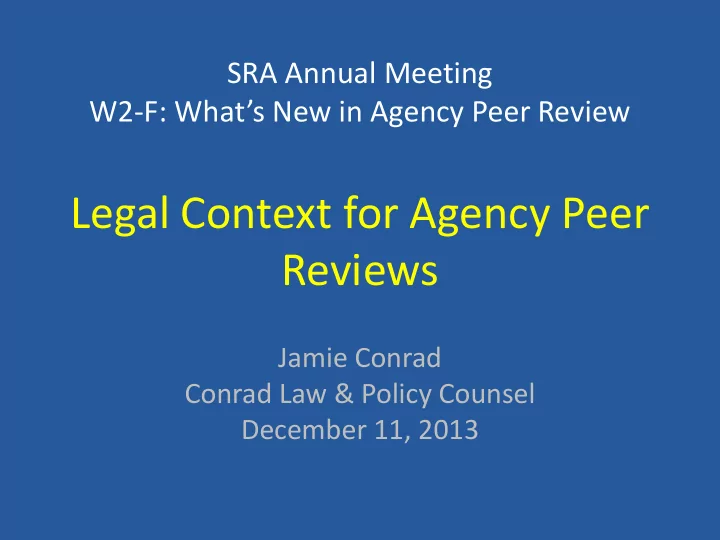

SRA Annual Meeting W2-F: What’s New in Agency Peer Review Legal Context for Agency Peer Reviews Jamie Conrad Conrad Law & Policy Counsel December 11, 2013
Legal Issues • Whether peer review is required • Notice/open meetings • Access to documents • Panel Selection 2
Sources of “Law” • U.S. Code (“statutes,” “laws”) • C.F.R. (agency regs under these laws) • OMB Peer Review Policy • Agency peer review policies • National Academies policies • Administrative Conference of the U.S. recommendations • Authoritative bodies (e.g. Bipartisan Policy Center) 3
Whether Required • Statute may require on standing basis – E.g., CASAC and NAAQS (42 U.S.C. § 7409(d)(2)) • Or on an ad hoc basis – E.g., NAS review of NTP listing of styrene in 12 th RoC (FY2012 HHS approps law) • Otherwise not required – OMB Peer Review Bulletin (agencies “shall” peer review influential scientific information they intend to disseminate) not enforceable by 3d parties 4
Notice/Access/Selection • Completely different legal frameworks apply to: – Government-managed reviews • Federal Advisory Committee Act (FACA) • US Criminal Code/Ethics in Gov’t Act – Contractor-managed reviews (not) • FAR/Agency acquisition regs 5
FACA • Applies if 1. Gov’t administers committee • Ktor exception • Subcommittee exception 2. Seeking consensus from reviewers • Doesn’t apply to “letter review” • Administered by GSA – Burdensome, though much burden self- imposed 6
FACA • Openness – Prior notice of meetings in Fed Reg – Open meetings unless exemption invoked – Public can “attend, appear before or file statements with” – Public access to documents provided to or generated by panel 7
FACA • Selection: – Panelists must be “special government employees” – Panels must be “fairly representative” • For scientific panels, of respected scientific points of view • NAS has own provisions; basically the same except for closed meetings 8
Selection • 18 U.S.C. § 219 • Ethics in Gov’t Act – Office of Gov’t Ethics (OGE) rules • Two main issues: – Conflict of interest – Appearance of lack of impartiality 9
Conflict of Interest • 5 C.F.R. Part 2635, Subpart D • Can’t participate in: – “particular matters” (vs. “broad policy options”) – with a “direct and predictable effect” – on a “financial interest” • Current $ interests only – No lookback – Stock ownership; typically not employment 10
Conflict of Interest • No “potential” COIs • Large body of OGE interpretation & guidance • Waivers allowed where gov’t need outweighs concern about COI – NAS uses – SAB never does 11
Lack of Impartiality • 5 C.F.R. Part 2635, Subpart E • Can’t participate in: – particular matter involving specific parties – affecting financial interests or covered relationships – if a reasonable person knowing relevant facts would question your impartiality • Also, “other circumstances” involving a particular matter that would raise impartiality concerns – E.g., particular matter of gen’l applicability (fracking) 12
Process • Confidential financial disclosure (e.g., EPA Form 3110-48) • SAB (gold standard) – Solicit nominations in Fed. Reg. – Solicit comments on proposed panelists via Fed. Reg. notice • Theoretically, this occurs after charge to panel is finalized (not) 13
Contractor-Managed Reviews • No requirements in FAR for – Prior notice – Open meetings (usually don’t have) – Access to documents • Selection process – Uses different terminology (“potential conflicts of interest”) – Much less guidance 14
Contractor-Managed Reviews • Not supervised by agency • Source of numerous flaps – Brominated flame retardants – Hexavalent chromium • Perciasepe memo (May 3, 2013) – Ktors must use same nomination/public comment process as SAB 15
Potential Reforms • Require contractors to apply OGE ethics terminology in selecting peer reviewers • Bring all reviews up to SAB process for reviewer selection • Improve public participation opportunities – More than 5 minutes at the end; able to engage panelists? – SAB invites panelists to engage commenters – IRIS process exploring > 5 minutes – Greater (some?) use of waivers 16
Recommend
More recommend